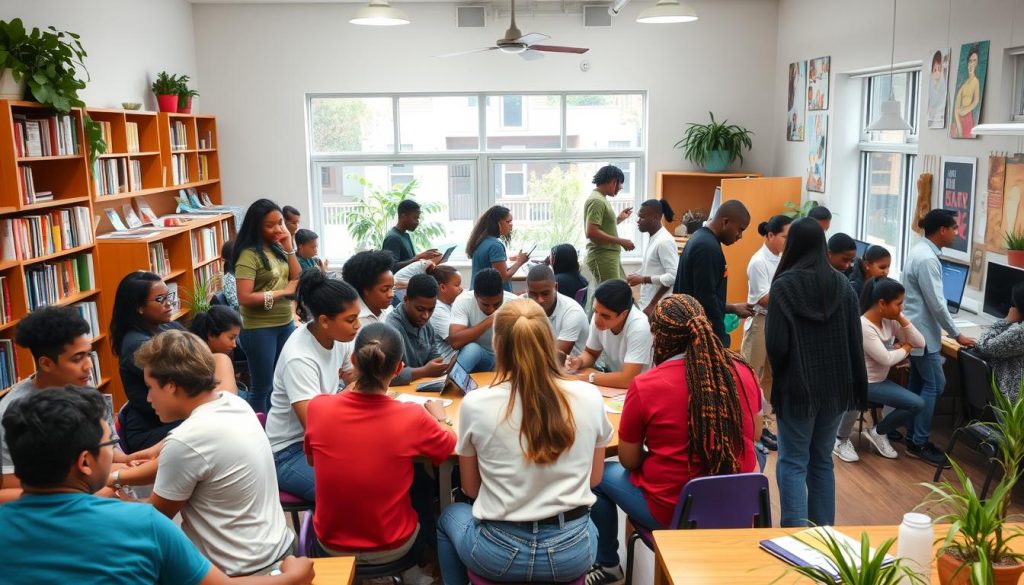Transitioning from foster care to adulthood is tough for foster teens. They face many challenges, from school to becoming independent. Programs like the Foster Care Transition Toolkit help a lot. It’s from the U.S. Department of Education.
Organizations like Foster 2 Success also offer great help. They assist with college, financial aid, and mentoring. Knowing about these resources can really help foster teens get ready for life after foster care.
Key Takeaways
- Only 2.5% of children who grow up in foster care graduate from a four-year college.
- Half a million foster children in the U.S. face intimidating challenges in school and affording education.
- Foster Care Transition Toolkit guides teens with information on college opportunities and financial aid.
- Various scholarships, grants, and loans are available exclusively for students in foster care.
- Mentorship programs like Foster Care to Success and Big Brothers Big Sisters support foster teens.
- Foster 2 Success provides resources like book money, living stipends, and personal mentors.
- Transition from high school to college is critical, requiring support in areas like housing and job hunting.
Understanding the Unique Challenges Foster Teens Face
Foster teens deal with many challenges that affect their growth and happiness. They face mental health issues, educational problems, and social challenges. These issues come from moving through the foster care system.
Mental Health Considerations
The mental health in foster care is a big worry. About 20% of foster kids show PTSD symptoms after abuse. They often struggle with anxiety, depression, and attachment problems because of past traumas.
These teens need regular treatment, like therapy and medicine. The constant change in their lives makes these problems worse. It’s key to tackle their mental health fully.
Educational Barriers
Education is another big challenge for foster teens. They have trouble keeping up with their classmates because of school changes. Studies show they graduate less and score lower on tests.
It’s vital to offer strong educational support foster care programs. Groups like Big Brothers Big Sisters and CASA help a lot. They help bridge the educational gaps.

Social Integration Issues
Foster teens face many social challenges. It’s hard for them to make lasting friends and keep up in school. They move a lot, which makes it hard to form close relationships.
These teens often feel left out. Joining a new social group can be very stressful. They need support networks and social programs to help them fit in. Rules in different states can also make things harder, like not being able to travel or have sleepovers.
It’s crucial to help foster teens with their mental health, education, and social issues. Understanding these challenges helps create a supportive environment for them to grow into adulthood.
The Importance of Stable Relationships in Foster Care
Stable relationships are key in foster care. They help foster teens grow and succeed. Trust and support from caregivers and peers are vital. LGBTQ parenting adds to the inclusivity and care for all.

Building Trust with Caregivers
The bond between foster teens and their caregivers is essential. Trust is the foundation of a stable home. It makes foster teens feel safe and ready for adulthood.
Having reliable caregivers boosts their self-esteem and resilience. This is crucial for their mental health.
Supporting Friendships and Peer Relationships
Friendships and peer support are also crucial. They make foster teens feel like they belong. These relationships help them develop social and emotional skills.
A supportive community is vital for their well-being. Studies, like those by Davidson & Cotter (1991), support this.
Agencies suggest six families support one foster family. This helps with transportation, babysitting, and education. A strong peer network is essential for growth. LGBTQ parenting ensures all teens get the care they need, making the environment inclusive and caring.
Key Life Skills Foster Teens Need Before Aging Out
As foster teens get ready to age out, teaching them key life skills is vital. These skills include financial literacy, career planning for youth, and household management. Learning these can help them face the future with confidence.
Financial Literacy and Budgeting
Financial literacy is key for foster youth to manage money well. They need to learn about budgeting, saving, and spending wisely. This knowledge helps them manage bank accounts, understand credit cards, and explore investments.
Teaching them to save and earn through chores is also important. It helps them develop good financial habits.
Job Readiness and Career Planning
Helping foster teens plan their careers is crucial. They need to learn how to write resumes, search for jobs, and ace interviews. These skills boost their job prospects and self-confidence.
Since about 40% of former foster youth struggle to find jobs, good job readiness programs are vital.
Basic Cooking and Household Management
Teaching foster teens basic household skills is essential. Learning to cook can lead to healthier eating. It also helps them develop a sense of responsibility.
Skills like laundry, dishwashing, and yard work teach them about work ethic and responsibility.
| Life Skills | Benefits |
|---|---|
| Financial Literacy | Budgeting, Saving, Managing Bank Accounts |
| Job Readiness | Improved Employment Prospects, Enhanced Self-Esteem |
| Household Management | Healthier Eating Habits, Responsibility, Work Ethic |
The Role of Community Resources in Supporting Transition
Community resources for foster teens are key to a smooth transition to adulthood. They offer programs and services that help with personal and educational growth. Mentorship and transitional housing are two main parts of this support.
Mentorship Programs
Mentorship in adoption and foster care is very important. It connects teens with adults who offer guidance and advice. The South Carolina Department of Social Services supports foster kids until they’re 21.
These programs help teens face challenges and prepare for the future. They focus on personal growth, education, career planning, and emotional support.
Community involvement, like mentorships, is vital for foster teens’ success as they grow up.

Transitional Housing Opportunities
Transitional housing is crucial for foster teens aging out. It provides a safe place to pursue goals. Services include case management, counseling, job training, and more.
Programs like Landmarks for Families teach life skills like money management and job readiness. They help foster teens build a strong foundation for independent living.
These programs also focus on education, offering tutoring and college prep. They aim to support foster teens’ growth and success in the long run.
Preparing for Legal Responsibilities at Age 18
As foster teens turn 18, they face new legal duties and rights. Being ready can protect them from problems and help them smoothly enter adulthood.
Understanding Legal Rights and Responsibilities
Turning 18 means becoming a legal adult. Young adults are now fully responsible for their actions. They can sign contracts, vote, and make their own choices. But, it’s key to know about foster care legal rights.
This includes knowing how adoption decrees and felony convictions can change legal ties. Agencies help by making sure minors’ legal actions are handled correctly.
Accessing Important Documents
Young adults need to get and keep important papers. These include birth certificates, Social Security cards, and legal documents from foster care. In North Carolina, the Department of Health and Human Services issues new birth certificates after adoption.
It’s also crucial for adoptees and their families to know that some documents are private. You need a court order to access them. This makes it easier to apply for jobs and college.
By knowing these things and getting their documents, foster teens can confidently start their adult lives. They’ll face fewer legal problems.
How Families Can Help During the Transition
Support from family is key for teens moving to adulthood in foster care. Talking openly and offering emotional support helps foster teens feel valued and hopeful. By discussing adoption and planning future goals, families can boost their self-worth and emotional growth.
Open Communication and Emotional Support
The emotional effects of fostering can be deep. Teens often face many placements, leading to trauma. This trauma can affect trust, attachment, and behavior.
Open talks help address these issues. Families can use tools like life books and photo albums to start these conversations. These tools help kids understand their stories and share their feelings, making adoption talks easier.
Involvement in Planning Future Goals
Getting teens involved in planning is vital. Talking about their interests and dreams helps them set realistic goals. This process prepares them for adulthood and boosts their confidence.
For example, making plans for education and careers together is helpful. It also helps them pursue higher education or vocational training. Having a plan for staying in touch with past families can also support their healing and provide a strong support network.
Building a lasting bond between adoptive parents and children is crucial. Families need ongoing support and emotional preparation for the challenges ahead. Professionals offer the education and support needed to help families understand their role and maintain important past relationships.
Continuing Support for Foster Teens After Aging Out
When foster teens grow up, they need ongoing support to thrive. There are many resources to help them with school, health care, and mental health. These services are key for a smooth transition to adulthood.
Navigating College or Vocational Training
Helping teens with college or vocational training is vital. The federal government funds Educational and Training Vouchers (ETVs) for this purpose. States manage these vouchers to support youth in their education.
Independent Living Programs also offer support. They help youth become independent. Websites like iFoster and Get My Future provide resources and career advice for foster youth.
Accessing Healthcare and Mental Health Services
Getting healthcare and mental health services is crucial for foster teens. Programs like Wraparound Intensive Services (WISe) support youth with complex health needs. They also help with financial and personal well-being.
The 2-1-1 service connects youth to health and human services. This makes it easier for them to find the support they need. Caseworkers play a big role, contacting youths within 10 days for EFC services.
For those returning to Extended Foster Care (EFC), a case plan is essential. It includes seven key elements and must be set up within 179 days. Quick help is needed if there are issues with foster care placements.
With these resources, foster teens can face adulthood with confidence. They gain stability, independence, and a positive outlook on their future.
